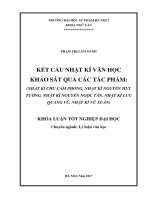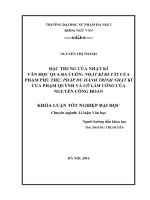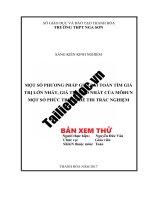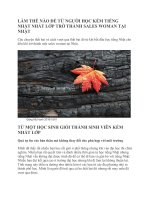Pp sx trà từ nhật
Bạn đang xem bản rút gọn của tài liệu. Xem và tải ngay bản đầy đủ của tài liệu tại đây (2.22 MB, 4 trang )
<span class="text_page_counter">Trang 1</span><div class="page_container" data-page="1">
<b>Making process of crude tea is divided into 6subprocesses. During these processes, six differentmanufacturing machines are used.</b>
<b>Green tea leaf storage apparatus: T his is combinedwith fan, humidifier, perforated plate, leaf spreader,collector and conveyor. After plucking, the fresh tealeaves are immediately carry into the apparatus.T he tea leaves are kept in the high humidity andcool air until inhibiting enzymes with steam at thenext process for 3 to 8 hours in this apparatus.</b>
<b>(1) Tea steaming machine : T his machine is madeup of a net drum and stirring shaft. Both partsare covered with a long steaming drum. Duringthis process, the oxidizing enzymes contained inthe fresh leaves are killed by the steam-heat.When the fermentation stops, the steamedleaves take on a fresh green color. T he leavesnow contain about 75 % water.</b>
<b>(2) Primary drying tea roller: T his machine is made up of an air-heating furnace and a main shaftwith the press arms and the stir arms in thedrying chamber. T he steamed leaves are twistedand dried in this machine until the moisture ofthe leaves is reduced to about 50 %.</b>
<b>(3) Tea roller. T his machine has a jacket in mortarfrom with a press cap, and a weight on the tablewith a pleated top. T he tea leaves are stuffedinto the revolving jacket with the weight andtwisted without heat. T he objective is to breakthe cells of the tea leaves, create flexiblity anduniform moisture.</b>
<b>(4) Secondary drying tea roller: T his machine has adirect fired furnace, a main shaft with press arms inthe rotary drum. It presses and dries the tealeaves. T he final moisture content is now about 30 %.</b>
<b>Making Process of Crude Tea (Sencha)</b>
<small>Primary drying tea rollerTea roller</small>
<small>Tea steaming machineSecondary drying tea rollerGreen tea leaf storage apparatus</small>
<b>Japanese Green Tea Producessing </b>
</div><span class="text_page_counter">Trang 2</span><div class="page_container" data-page="2"><small>Modern tea factory by control of computer</small>
<b>(5) Final drying tea roller: This machine is made up ofa burner, rolling hands and pans with manypleats. Its function is to dry the leaves until themoisture content is 13 %. T his pressing andheating forms the characteristic needle shapeand produces the fragrance.</b>
<b>(6) Tea dryer: T his machine consists of an airheating furnace, a drying chamber, and netconveyors. T he aim of this step is to uniformlyreduce the water content in the leaves fromabout 13 % to 6 % while maintaining the qualityand fragrance. </b>
<b>T he tea treated with these 6 machines iscalled‘Aracha’in Japanese. Aracha means acrude tea. Generally these processes are carriedout by the farmer.</b>
<b>T his factory is managed with an individual or acooperative. T he machines are almost operated byautomatic control. Each machine is connectedefficiently by a conveyor or other transport facilityand is controled by computers. T he number of </b>
<b>workdays of a factory is about 50 days for a year.Tea manufacturing capacity differs largelydepending on a scale. Crude tea amount ofproduction is about 10 tons in the largest scalefactory in a day.</b>
<small>Finally drying tea rollerTea dryer</small>
<b>Modern Crude Tea Factory</b>
<small>Tea steaming machinePrimary drying tea rollerTea roller</small>
<small>Secondary drying tea rollerFinal drying tea rollerTea dryer</small>
<small>35∼50 r.p.m.36∼38 r.p.m.22∼28 r.p.m.26∼28 r.p.m.50∼60 c.p.m.</small>
<small>steam90∼110 ℃non heating50∼60 ℃80∼90 ℃(pan temp.)</small>
<small>70∼90 ℃</small>
<b><small>Air temp.</small></b>
<small>30∼60 sec.30∼45 min15 min30∼40 min30∼40 min25∼30 min</small>
<b><small>Time required</small></b>
<small>0 %55∼60 %0 %58∼70 %73∼75 %77 %</small>
<b><small>Less weightWater content</small></b>
<small>75 %50 %50 %30 %13 %6 %</small>
<b>Standard in making process of crude tea(Sencha)</b>
<b>Japanese Green Tee</b>
</div><span class="text_page_counter">Trang 3</span><div class="page_container" data-page="3"><b>Tencha is a material of Matcha. T his is made fromleaves grown under the shade before harvest, thesame as Gyokuro production. Only the handplucked flush leaves grown in the tea field iscovered with straw, reed or cloth to shut off sunlightwhen young new shoots have two to three leaves,are used to made this special tea. T hemanufacturing process of Tencha is very simple, but itis difficult to control the process to make good one.To make this tea, unlike other green tea products,the process after steaming includes only drying,without rolling process.</b>
<small>Tea leaf cooling spreader</small>
<small>Pan for hand made of Kamairicha</small>
<small>Tea leaf parcherThe conveyor in Tencha dryer</small>
<small>Tencha dryer</small>
<b>Japanese Green Tea Producessing </b>
<b>Kamairicha is a panfired tea and its manufacturingprocess is similar to that of Chinese green tea. T his tea is mainly manufactured in Kyushu district. Tomake this tea, fresh tea leaves are heated directly onan iron plate of 300 to 350 ℃ , is called tea leafparcher, to remove the activity of oxidizing enzymescontained in the leaves. This heating process lastsabout 10 minutes. The temperatures of the ironplate is kept higher at first, and gradually lowered.After that, the moisture content of the leaves isuniformed in a tea roller, and then their shape isformed like“comma-shape ” in a secondary teadryer and final tea parching machine for Kamairicha.Because the leaves are parched, Kamairicha isyellowish on the surface. Pressure applied to theleaves is smaller, and the taste is somewhat plainbut refreshing, with no green note. </b>
</div><span class="text_page_counter">Trang 4</span><div class="page_container" data-page="4"><b>T his factory is managed by a tea wholesale dealer. It is always maintained cleanly. Its floor is made ofwood traditionally. T here are tea refining machines, tea firing machine, optical tea stalk separator, teacutter, tea blender and tea packing machine in thefactory.</b>
<b>Tea refining machine is composed of the varioussieves in size. Crude tea is firstly classifiedaccording to size by this machine in the refined teafactory.</b>
<b>Optical tea stalk separator is the device thatseparates stalks and the branches in a crude tea.Perceiving a difference of color of leaves, and stalksand branches by the light sensor, only stalks and </b>
<b>branches were blow off by the compressed air. It isabout 300 kg as to processing volume per hour.</b>
<b>Refined Tea Factory</b>
<b>Once tea production was carried out with handwork all. T his operation is called to‘ Temomi’.After steaming of raw tea leaves, all operations ofmaking processing are carried out by a man on atable called‘ Hoiro’. T here is a fire furnace underthis table. Steamed tea leaves are made to a thinlong form on the table by the skillful hand handling.T he making process by Temomi takes for about 4hours. T he temomi process consists of 9 differentoperations. Today, these operations are referredgreatly to the modern tea manufacture machines.</b>
<small>Tea refining machine</small>
<small>Hand made by Temomi master</small>
<small>Contest of TemomiDemonstration of Temomi in tea-festival</small>
<b>Japanese Green Tee</b>
</div>








